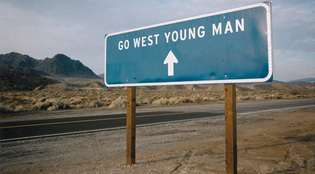 loading
loading
Arts & CultureYou can quote themHorace Greeley and the motto for westward expansion. Yale law librarian Fred R. Shapiro is editor of the Yale Book of Quotations.  PHoto illustration: John Paul ChirdonView full imageThere are often three stages of knowledge about a famous quotation. The first level is the commonly accepted popular attribution. The second level is a more sophisticated theory, circulating among reference works and commentators, that debunks the popular account. The third level is the true explanation. It exposes the "sophisticated" second-level story as itself fallacious. One of the best examples is "Go West, young man," a crucial phrase in American history as the motto for westward expansion. For this quotation, the standard reference works have been stuck on the second level for many decades. In the nineteenth century, "Go West, young man" was popularly credited to Horace Greeley, reformer and editor of the New York Tribune. Today, major quotation dictionaries seem to know better. Bartlett's lists the quote under the name of Indiana newspaper editor John Babson Lane Soule, sourcing it to "Article in the Terre Haute Express [1851]." A footnote states: "Horace Greeley used the expression in an editorial in the New York Tribune. As the saying 'Go west, young man, and grow up with the country' gained popularity, Greeley printed Soule's article, to show the source of his inspiration." The Oxford Dictionary of Quotations, usually much better researched than Bartlett's, gives an unusual variant of the Soule story. The ODQ prints "Go West, young man, and grow up with the country" under Greeley, citing his 1850 book Hints Toward Reform. But the supposed Soule usage is also given its due, with "Go West, young man, go West!" ascribed to "editorial in Terre Haute [Indiana] Express (1851), by John L. B. Soule." And the Oxford English Dictionary, which normally verifies every citation in the original source, furnishes an uncharacteristically vague citation to Soule. Virtually every fact about "Go West, young man" in the three dictionaries just mentioned is wrong. Inspection of Greeley's Hints Toward Reform shows that the famous exhortation does not appear in that book. Yale Book of Quotations research editor Thomas Fuller read through the 1851 Terre Haute Express at the Library of Congress and found no sign of the phrase. Fuller concluded, in the September 2004 Indiana Magazine of History, that "John Soule had nothing whatsoever to do with the phrase." Fuller was also unable to find it in Greeley's writings, including the New York Tribune and other sources where various people have claimed it occurred. On the other hand, there is substantial evidence that "Go West, young man" is a paraphrase of various statements uttered by Greeley. Josiah Grinnell asserts plausibly in his 1891 autobiography that Greeley gave him the celebrated advice in September 1853. James Parton, in The Life of Horace Greeley (1855), quotes Greeley: "I want to go into business, is the aspiration of our young men. . . . Friend, we answer to many, . . . turn your face to the Great West, and there build up a home and fortune." Finally, for his 2006 book Horace Greeley, Robert C. Williams unearthed an early and close version of the saying. In the August 25, 1838, issue of the New Yorker, Greeley is quoted as follows: "If any young man is about to commence the world, we say to him, publicly and privately, Go to the West." For this quotation, then, the third level of understanding actually returns us to the first one. The words of Horace Greeley were the apparent inspiration for the famous motto.
The comment period has expired.
|
|